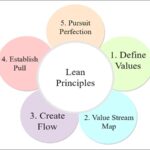Lean methodology, also known as Lean manufacturing or simply Lean. It is a management philosophy and methodology that originated in the manufacturing industry. But has since been adopted by various other industries. The basic idea behind lean consulting is to optimize processes and eliminate waste to create more value with less effort. This approach is based on the principle of continuous improvement. Where small incremental changes are made over time to improve efficiency and productivity. In this article, we will provide an introduction to Lean methodology, including its history, principles, and benefits.
History of Lean Methodology
The concept of Lean originated in Japan in the 1940s and 1950s, with the development of Toyota Production. TPS was designed to reduce waste and improve efficiency in the manufacturing process by focusing. On the elimination of seven types of waste. Overproduction, waiting, transportation, overprocessing, excess inventory, unnecessary motion, and defects. This approach was highly successful, and TPS became a model for Lean methodology.
Principles of Lean Methodology
The principles of Lean methodology can be summarized in five key concepts:
- Value: The first principle of Lean methodology is to identify the value that the customer is seeking. This value can be defined as any activity that the customer is willing to pay for.
- Value Stream: The second principle of Lean methodology is to identify the value stream, which is the sequence of activities that are required to produce the product or service.
- Flow: The third principle of Lean methodology is to ensure that the value stream flows smoothly and continuously, without any interruptions or delays.
- Pull: The fourth principle of Lean methodology is to implement a pull system, where the customer pulls the product or service through the value stream, rather than the company pushing it.
- Perfection: The fifth principle of Lean methodology is to strive for perfection by continuously improving the value stream and eliminating waste.
Benefits of Lean Methodology
There are several benefits to adopting Lean methodology, including:
- Improved efficiency: By optimizing processes and eliminating waste, Lean methodology can improve efficiency and reduce costs.
- Improved quality: By focusing on the elimination of defects, Lean methodology can improve product and service quality.
- Increased customer satisfaction: By focusing on value and continuous improvement, Lean methodology can increase customer satisfaction and loyalty.
- Improved employee morale: By involving employees in the continuous improvement process, Lean methodology can improve employee morale and engagement.
- Increased innovation: By focusing on continuous improvement, Lean methodology can encourage innovation and new ideas.
Tools and Techniques of Lean Methodology
There are several tools and techniques that are used in Lean methodology. These include:
- 5S: This is a technique that is used to organize the workplace and eliminate waste. The five S’s stand for Sort, Set in order, Shine, Standardize, and Sustain.
- Kaizen: This is a technique that is used to continuously improve the process. It involves making small incremental changes to the process to eliminate waste and improve efficiency.
- Kanban: This is a technique that is used to manage inventory. It involves using a visual system to track inventory levels and ensure that products or services are produced only when they are needed.
- Value stream mapping: This is a technique that is used to map out the entire process and identify areas where waste can be eliminated.
Conclusion
Introduction to Lean Methodology is a management philosophy and methodology that originated in the manufacturing industry but has since been adopted by various other industries. The basic idea behind Lean is to optimize processes and eliminate waste to create more value with less effort. This approach is based on the principle of continuous improvement, where small incremental changes are made over time to improve efficiency and productivity. By adopting the Lean methodology, organizations can achieve improved efficiency, quality, customer satisfaction, employee morale, and innovation.










